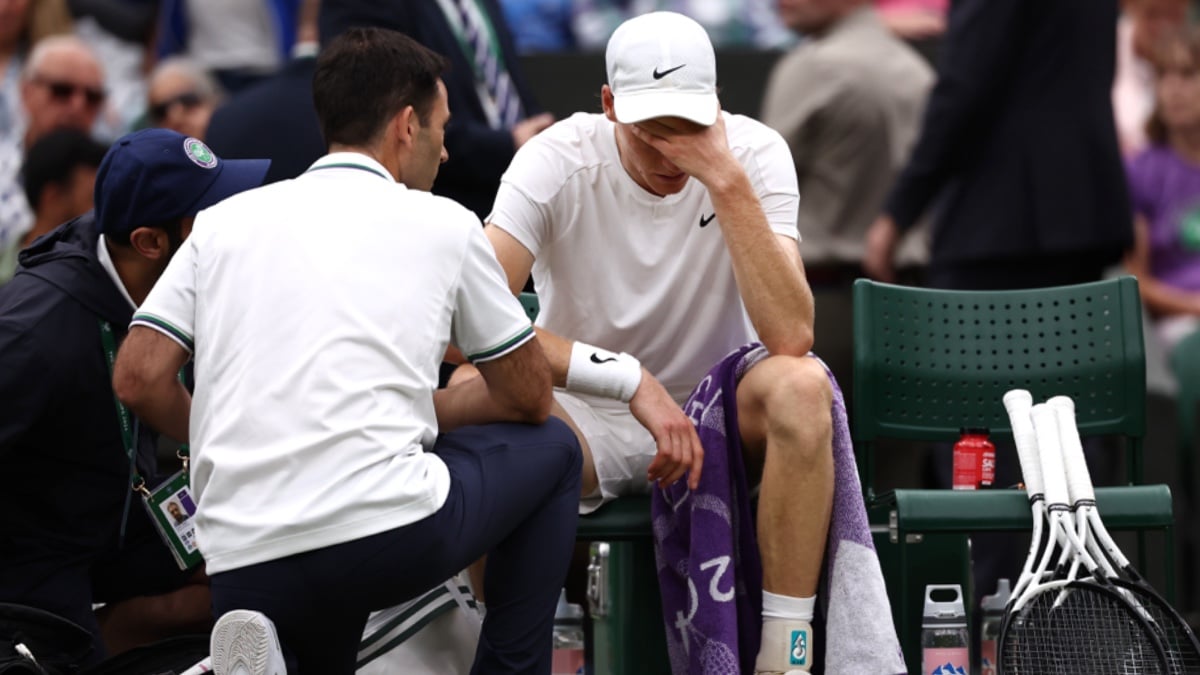Jannik Sinner, the first Italian tennis player in history to top the world rankings, was favored to win this year’s Wimbledon — that is, until an unusual occurrence on Centre Court sparked controversy.
Sinner’s climb to the top was highlighted by winning the Australian Open earlier this year, when he knocked off then-ranked world No. 1 Novak Djokovic in the semi-finals. It was Djokovic’s first defeat at the Aussie Open in 6 years. Sinner then, Sinner found himself down two sets to none in the final against Daniil Medvedev, but stormed back to defeat the Russian and become the first Italian ever to win the Australian Open.
At the time, this wasn’t enough to rank Sinner as the best tennis player in the world, but when Djokovic withdrew from last month’s French Open — coupled with Sinner going all the way to the semi-finals — then he finally unseated Djokovic for No. 1 in the world.
Party time, right? Enter Wimbledon.
The 22-year old Italian was in fine form during the first week, cruising into the quarter-finals on Tuesday of week two having only dropped two total sets in his first four matches. Then he met familiar foe, Daniil Medvedev, in the quarters.
Sinner stole the first set in a tie-break but dropped the next set, during which he was clearly not physically well.
He lost the third set tiebreak, but not before calling timeout. It wasn’t for an injury, however. Sinner had been struggling, was clearly pale, and it was almost as if he was rapidly catching a fever. Fans likely began wondering if they’d see a repeat of his performance in Beijing last year, when he threw up in a trash can on court, a tournament which coincidentally ended with him beating Medvedev.
Maybe he was just sick of Medvedev.
There would be no trash can incident this time, but Sinner soon asked for medical assistance, had his oxygen checked and his heart rate checked, then departed the court with the medical staff, despite initially not wanting to.
Although no medical timeout was announced, he was gone for eleven minutes.
Tennis rules allow a player to be checked for as much as 3 minutes while on court. However, the rules are sketchy thereafter. If medics determine that he must be treated off the court, then it’s the chair umpire’s discretion — pending on the timetable offered by the medics — whether the player should suffer any point penalties upon return.
Once Sinner returned, looking better, the umpire gave no penalties, and play continued. Incredibly, Sinner then won the fourth set to force a final fifth set, seemingly coming back from he dead. This fueled some backlash from tennis fans who — though happy to see Sinner feeling better — argued that the rules shouldn’t allow a sick player to be treated for such a length of time without any penalty.
However, the potential controversy will likely not heat up, because Sinner didn’t have enough in him to win it. Medvedev thus earned a bit of revenge from the Aussie Open loss.
Medics had continued to monitor Sinner throughout. After the match, Sinner was obviously asked about what happened, to which he answered he did not feel good in the morning, but added that when he was treated on-court, “the physio told me it was better to take some time because he watched me and I didn’t seem in hope to play. I was struggling physically.”
It’s worth noting that tennis rules do not allow players to be treated for fatigue, something that Sinner claimed he felt. However, if that fatigue is related to a sickness, then the rules become unclear.
Medvedev now has a major showdown in the semi-finals against a very healthy and dangerous Carlos Alcaraz, who will be favored to win the match.

